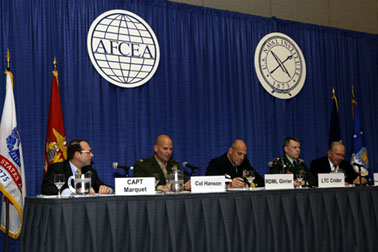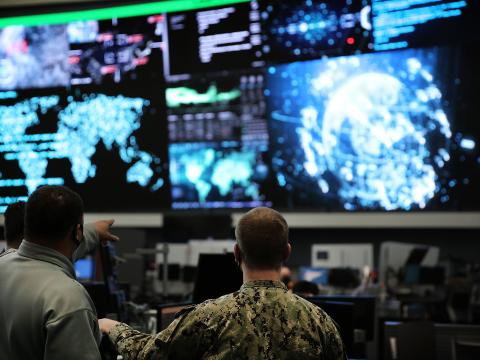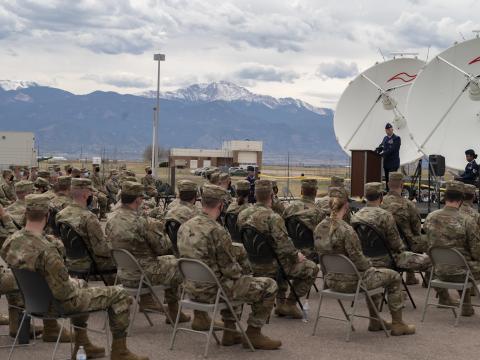 |
| How do we find, develop and promote people with the right stuff? Trying to answer that are (l-r) Capt. L. David Marquet, USN (Ret.); Col. Steven M. Hanson, USMC; Rear Adm. Robert P. Girrier, USN; Lt. Col. James R. Crider, USA; and panel moderator Vice Adm. Albert H. Konetzni, USN (Ret.). |
New qualities such as initiative, adaptability and technological knowledge are replacing traditional military criteria for leadership. Panelists discussing "how to find, develop and promote people with the right stuff" cited traits that are valuable in the information age of asymmetric warfare. However, the Navy must change its way of rating and promoting personnel if these qualities are to dominate.
Capt. David L. Marquet, USN (Ret.), strategist, Navy's QDR Integration Group, observed that the number of Navy officers has increased, but the number of officers serving on ships has declined. This will have significant ramifications, particularly in promotion where sea duty is a litmus test.
Rear Adm. Robert L. Girrier, USN, vice commander of the Naval Mine and ASW Command, said the Navy seeks those who value service, loyalty and teamwork and are adaptive, innovative and technically adept. A deep desire for self-improvement is a powerful motivator, he added.
Being under fire brings specific qualities to the fore. Col. Steve Hanson, USMC, assistant chief of staff, G-2, 1st Marine Division, is a former combat advisor team leader in Iraq. He said that the best combat leaders have the courage to work through their fears and are selfless to the point of risking the ultimate sacrifice. Loyalty from the top down is another key quality. A good commander, he said, would have a love for his men in his unit that they would feel-and, in turn, would reciprocate through dedication and loyalty to the point of going against their survival instincts.
But many of these qualities will be overlooked if the Navy does not revamp its personnel system. Several audience members contributed stories about themselves or other naval colleagues whose attempts at self-improvement or advancement were being stymied by the system.




